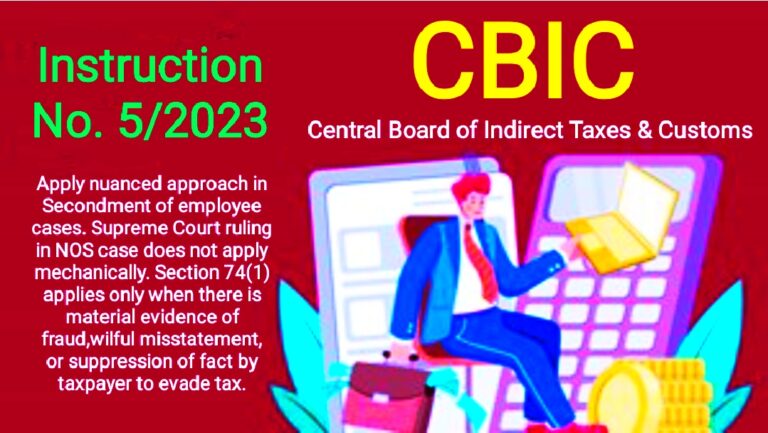CBIC Instruction 5/2023 (GST) Benefiting MNCs: Evaluate Secondment Cases Carefully. Supreme Court Ruling In Northern Operating Systems Case Does Not Apply Mechanically. Apply Section 74(1) only When there is Material Evidence of Fraud, Wilful Misstatement, or Suppression of Fact by Taxpayer to Evade Tax.
GST Instruction by CBIC – A Big Relief for MNCs: In a significant development benefiting the Multi National Companies (MNCs), the Central Board of Indirect Taxes and Customs (CBIC) has issued crucial instruction to GST officers, urging them to exercise caution when raising tax demands in cases involving the secondment of employees. The directive emphasizes that the Supreme Court ruling in the Northern Operating Systems Pvt Ltd case should not be applied mechanically. Specifically, the CBIC has instructed officers to invoke Section 74(1) of the CGST Act for issuing show cause notices only when there is concrete evidence of fraud, wilful misstatement, or suppression of facts aimed at evading taxes by the taxpayer.
CBIC has drawn the attention of GST officers to the Hon’ble Supreme Court’s landmark judgment on May 19, 2022, in the case of CC, CE & ST, Bangalore (Adj.) etc. Vs. Northern Operating Systems Private Limited (NOS). This judgment addresses the intricacies of the secondment of employees by overseas entities to Indian firms and its implications on Service Tax.
The issuance of this directive follows representations made to the CBIC, highlighting that, post the aforementioned judgment, several field formations have initiated proceedings alleging GST evasion related to secondment under Section 74(1) of the CGST Act. In response, CBIC thoroughly examined the matter and issued these instructions to ensure a fair and balanced approach in such cases.
Instruction of CBIC for GST Officers:
The recent judgment of the Hon’ble Supreme Court in the Northern Operating Systems Private Limited (NOS) case underscores the importance of a nuanced examination of each secondment arrangement, taking into account their unique characteristics. While the judgment focused on Service Tax, the implications extend to GST also, but it emphasizes the need for a careful and individualized assessment rather than a one-size-fits-all approach to all cases.
Referring to a previous case involving M/s Fiat India(P) Ltd, the Supreme Court emphasized the importance of considering specific facts of each case. This cautionary note highlights the need to avoid simplistic comparisons and underscores the significance of unique characteristic of each cases in determining tax liability.
It is crucial to recognize the diverse nature of secondment arrangements between overseas group companies and Indian entities. The tax implications vary based on specific nature of contract and terms. The CBIC advises against a mechanical application of the NOS judgment, stressing the need for a meticulous evaluation of factual matrix of each case.
The industry has raised concerns about the mechanical invocation of extended limitation periods under section 74(1) of the CGST Act in secondment cases.
Section 74(1) of the CGST Act specifies conditions for its invocation, emphasizing fraud, wilful misstatement, or suppression of facts by taxpayers to evade tax. The wording of section 74(1) clarifies that it should only be invoked when there is material evidence of fraud, wilful misstatement or suppression of facts by taxpayers related to tax evasion. Non-payment of GST alone is insufficient. Evidence supporting the invocation of section 74(1) should be explicitly mentioned in any show cause notice.
When investigating secondment cases, GST officers should consider the unique aspects outlined above and exercise discretion in issuing show cause notices.
Download the Notification of Instruction 5/2023 HERE
To Access the CBIC Instruction No. 5/2023 (GST) from GST Portal CLICK HERE
To Read About GST Provisions of Suspension of Registration CLICK HERE
READ MORE
